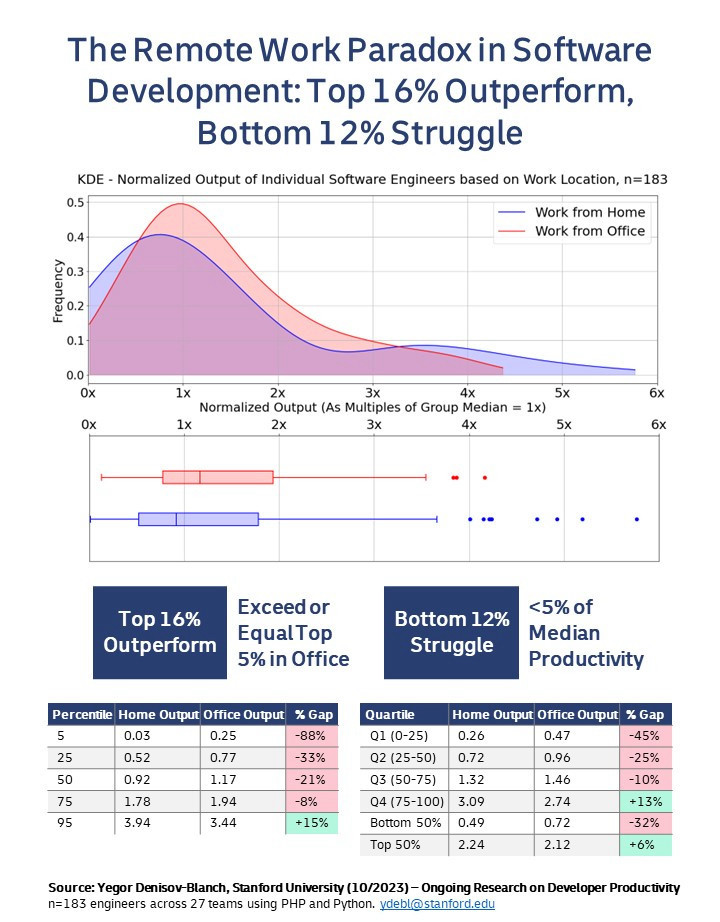Data showing the top 16% of remote workers outperform the top 5% in-office, while the bottom 12% underperform the bottom 5% in-office, makes sense.
Top performers thrive with extra time from no commute, but underperformers struggle without oversight. RTO penalizes top talent for others’ inability.
Top performers thrive with extra time from no commute, but underperformers struggle without oversight. RTO penalizes top talent for others’ inability.

Comments
Reply with 📌, and the post will be added to your 📌 feed.
It's mainly a training issue - new starters in that 12% are the ones worth trying to improve.
Instead create mentor roles (for those that want it) and target the training.
https://www.linkedin.com/posts/ydenisov_remotework-futureofwork-softwareengineering-activity-7125119331989950465-nqB0
Would love to vetter understand, too, how much of the underperformance of others is driven by the lack of physical access to the model employee.
even though I'm on the side of remote work I'm not sure we can glean much representative from this, bc low number + filtering companies by language
When I saw PHP, I imagined most of those 27 teams maintaining wordpress themes all day long.
Had me wonder on productivity of engineers in products vs engineers in services.
Gut feel tells me the remote/office gap must be different between the two.
I'm disgustingly under-compensated. Of course I do the absolute minimum for my position. Working from home means I can't be hassled about it while I work to be able to say "screw you" and leave.
What I do know is that inexperienced dev and other hires struggle with remote unless significant practices are place.
In the upper bands, pay was linked to local COL, because you had to be somewhere. Firms will realize they can save loads by paying Peoria wages.
How does the office look now?
Or employers should push for RTO to pay more?
Firms maximize profit. If offices don't matter, neither does your choice to live.
They don't care - and don't have to - about your commute. I did 6h DAILY once. Bo.
Suggesting that RTO has any benefits because people get paid more, to cover more expensive bills, still means *others* get rich from the workers commute.
But that wasn't the point.
Employers have for decades been moving work to lower cost areas.
You're kind of a dick and I don't wish to continue discussing anything with someone like that.
Many people happily would take non-NYC wages and work remotely because your take home pay is often higher even with the COL adjustment.
There are a lot more trade offs than you might consider.
But I'd love to see NYC become more livable when it doesn't have to be everyone's premier address.
Managers usually want the top performers to help the rest of the team. In theory net performance and net happiness is higher
Most high performers can learn the skill set with practice and effort.
Folks that want to mentor are just better at it and improve others more.
The reality is that top performers mentoring the willing-to-learn is generally good, while mentoring the unwilling-to-learn is not worth the cost.
What's your experience? Curious to hear.
Your comment that helping out is "too hard" makes me wonder if you're talking about Top Performers not wanting to do their coworkers' work
My observation is that helping low productivity workers into higher productivity workers (in software eng) is harder than writing software. Especially when the senior engineers know their code base and problem space well.
This can probably be addressed with work structure changes, but that seems to be harder than mandating at least partial in-office.